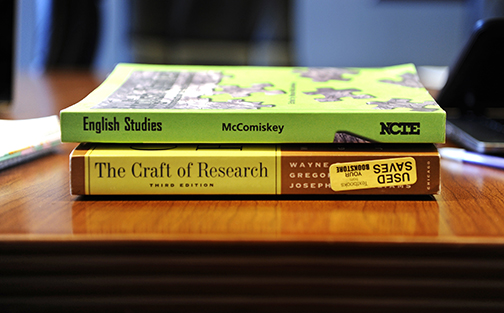English
The Master of Arts program consists of 27 credit hours of letter-graded course work with an overall GPA of 3.0 or better, and (at least) a 3 credit Master's Paper. Note that ENGL 764 Teaching Workshop for Writing Instructorsis required of all GTAs who have not taken a similar class elsewhere.
| Code | Title | Credits |
|---|---|---|
| Core Courses | 9 | |
| Composition Theory | ||
| Graduate Scholarship | ||
| Critical Theory | ||
| Rhetoric/Writing/Linguistics | 6 | |
| Literature | 6 | |
| Other/Electives | 6 | |
| ENGL 797 | Master's Paper | 3 |
| Total Credits | 30 | |
Ph.D. Rhetoric, Writing and Culture
-
Course List Code Title Credits Ph.D. Core 12 Composition Theory Composition Research Graduate Scholarship Critical Theory Other research methods 3 Qualitative Research Methods in Communication Rhetorical Criticism Usability and User Experience Qualitative Methods Quantitative Methods Pedagogy 3 Teaching Workshop for Writing Instructors Upper Division Writing: Pedagogy, Practice, and Technology Teaching Literature Additional graduate-level courses 1 21-51 Experiential learning 2 9 Dissertation Research 15 Doctoral Dissertation - 1
Students select, in consultation with their advisor, additional courses inside the English department that match their research and deepen their understanding of the field. Three additional methods, pedagogy, or theory courses may be taken from outside the English department, as approved by advisor and graduate director. Courses in this category may be at the 600-, 700-, or 800-level. Note that students with no background in English studies must include courses in literature and linguistics in their plan of study and that topics and studies courses may be repeated.
- 2
Teaching Mentorship (0-6 credits); may be take twice but total may not exceed 6 credits.
- Students work with faculty to read theory and co-teach 200, 300, or 400 level class.
ENGL 7-892 Graduate Teaching Mentorship
Internship (0-6 credits); may be taken twice but total may not exceed 6 credits.
- Students work in administrative, editing, consulting, or writing roles.
ENGL 7-894 Internship
Life experience (0-3 credits).
- Students submit, in consultation with their advisor and the graduate director, a portfolio that reflects their professional experience prior to enrolling in the program. GRAD_EXL_7-895_Field_Experience (F 22).docx
- Students work with faculty to read theory and co-teach 200, 300, or 400 level class.
Comprehensive Exams
Comprehensive exams are taken after the successful completion of 72 credits (grade B or higher) and are administered by the student’s supervisory committee, which is comprised of a committee chair and two readers from within the department. The exams consist of two timed, written exams.
Dissertation: 15 credits (English 899)
The dissertation proposal precedes formal work on the dissertation. The supervisory committee is comprised of the three members of the exam committee, plus a Graduate School Representative (GSR) from outside the department.
Anastassiya Andrianova, Ph.D.
City University of New York, 2011
Field: British Romantic and Victorian Literature, Drama, Translation, Pedagogy, Postcolonial Literature, Slavic Literature, Animal Studies
Lisa R. Arnold, Ph.D.
University of Louisville, 2011
Field: Rhetoric and Composition, Writing Program Administration, History of Writing Instruction
Sean Burt, Ph.D.
Duke University, 2009
Field: Ancient Jewish Literature, Genre Theory, Ancient Hebrew Poetry, Poetics, Horror Literature & Theory
Adam Goldwyn, Ph.D.
City University of New York, 2010
Field: Medieval Studies, Medieval Greek World, Influence of Ancient Greek Culture in the Middle Ages
Amy Gore, Ph.D.
University of New Mexico, 2019
Field: Early Indigenous and American literatures, Book history, Gothic literature, Body studies, and the Recovery of marginalized women and Native American writers
Alison Graham-Bertolini, Ph.D.
Louisiana State University, 2009
Field: Contemporary American Literature, Literature of the Southern United States, Women's Literature, Contemporary Ethnic and Postcolonial Literature
Daniel Kenzie, Ph.D., Affiliated Faculty
Purdue University, 2017
Rhetoric & Composition, Professional & Technical Writing, Rhetoric of Health & Medicine, Disability Studies
Verena Theile, Ph.D.
Washington State University, Pullman, 2006
Field: 16th/17th Century Literature, Shakespeare, Early Modern Drama, European Literature, Literary Theory, Science Fiction and Fantasy, Film and Adaptation Studies
Emeritus Faculty
Linda L. Helstern, Ph.D., Emerita
Southern Illinois University-Carbondale, 2001
Field: Native American Literature, Modernism, Contemporary Poetry, Literature and the Environment
R.S. Krishnan, Ph.D., Emeritus
University of Nebraska, 1981
Field: Restoration and 18th-Century British Literature, Postmodern Theories, British Novel, Postcolonial Literature
Bruce Maylath, Ph.D., Emeritus
University of Minnesota, 1994
Field: International Technical Communication, Rhetoric and Composition, Linguistics
Robert O'Connor, Ph.D., Emeritus
Bowling Green State University, 1979
Field: Romantic Literature, Science Fiction and Fantasy
Dale Sullivan, Ph.D., Emeritus
Rensselaer Polytechnic Institute, 1988
Field: Rhetoric Theory and History, Rhetoric of Science, Rhetoric of Religion, Technical Communication

